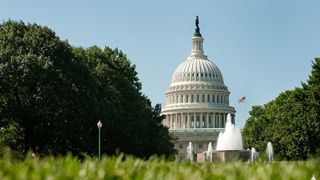D.C. Weighs in on FCC's 6 GHz Unlicensed Vote

The communications industry rushed to their email servers, most to serve up praise for the FCC's vote to propose opening up the entire 6 GHz band for unlicensed WiFi.
Cable operators had backed the item, seeking more spectrum for the WiFi that it their primary mobile broadband play, along with computer companies who pushed hard for opening up all the band. Broadcasters, by contrast, had issues with interference to the incumbent electronic news gathering (ENG) services that use the band.
“The Commission’s unanimous, bipartisan vote on 6 GHz will go a long way toward advancing the next generation of super fast WiFi connectivity while also protecting TV production operations critical to providing American consumers with high-quality programming," said Michael Powell, chairman of NCTA-The Internet & Television Association. "Traffic forecasts show that the need for additional unlicensed spectrum is urgent, and now more than ever we’re working, learning, accessing health and financial services, staying entertained and informed, and remaining connected through our WiFi networks. We thank the Commission for their tireless efforts to ensure that sufficient unlicensed spectrum is available to support growing demand for next-generation, high-speed WiFi connectivity that will serve consumers for years to come.”
“I commend the FCC for this historic investment in expanding unlicensed spectrum," said Rep. Anna Eshoo (D-Calif.), who represents Silicon Valley. "This decision will enable countless innovations in AI, virtual and augmented reality, robotics, and use cases we can’t even imagine, for years to come. Most importantly, this spectrum will be transformational for the future of telehealth, which has become a central part of our country’s response to the coronavirus.”
"Today, the Federal Communications Commission (FCC) made a historic and visionary decision that will transform wireless connectivity for decades to come," said the WiFi Alliance. "By making 1200 megahertz of spectrum in 6 GHz available for unlicensed innovation, the Commission opened the flood gates of WiFi benefits for American consumers, enterprises and the economy. Most importantly, the FCC decision ensures that WiFi users can stay connected to colleagues and family, and to healthcare, business, education, and other critical services."
The future of connectivity is at hand,” said Craig Cowden, SVP of wireless technology, for Charter. “The FCC vote to allow unlicensed sharing in 6 GHz will transform WiFi and our daily lives by unleashing innovation that will create immersive online learning and training experiences, advanced telehealth, ultra-high-resolution entertainment, and much more.”
“The FCC’s unanimous vote to open the entire 6 GHz band for unlicensed sharing will enable gigabit-fast WiFi in every home, school, and enterprise," said Michael Calabrese, director of the Wireless Future Project at New America’s Open Technology Institute. "Access to this band of frequencies will accelerate the availability and affordability of next-generation internet applications and services nationwide.
Broadcasting & Cable Newsletter
The smarter way to stay on top of broadcasting and cable industry. Sign up below
“Today’s unanimous FCC vote will quickly benefit consumers who are using WiFi now more than ever to work and learn from home, to watch shows and to video conference, and to shop and to get their news," said Tony Werner, president of TPX, for Comcast Cable. "The Order making 1200 megahertz of unlicensed spectrum available in the 6 GHz band will dramatically improve WiFi performance and capacity, and will protect existing users of the spectrum. It is a significant step on the path to deploying next generation, gigabit WiFi services to complement our world‑class gigabit broadband networks.”
"Today’s action by the FCC to unleash 1,200 MHz of unlicensed 6 GHz spectrum – including up to 850 MHz of automated frequency coordinated spectrum for standard power outdoor use – should help break the spectrum logjam that threatens our livelihoods," said Claude Aiken, president and CEO of WISPA. "It should provide more fuel and space for innovators to meet growing demand and foster the next generation of innovative connectivity and services for wireless consumers."
“We applaud the FCC for making the 6 GHz band open for unlicensed use," said Bertram Lee, policy counsel at Public Knowledge. "The FCC has looked at all of the evidence and crafted rules that protect the incumbents in the band while permitting innovation in wireless technology. Consumers will potentially see concrete benefits from these new rules as early as this holiday season, when new equipment capable of using the entire 6 GHz band enables home devices to run at gigabit speeds."
Contributing editor John Eggerton has been an editor and/or writer on media regulation, legislation and policy for over four decades, including covering the FCC, FTC, Congress, the major media trade associations, and the federal courts. In addition to Multichannel News and Broadcasting + Cable, his work has appeared in Radio World, TV Technology, TV Fax, This Week in Consumer Electronics, Variety and the Encyclopedia Britannica.

